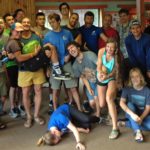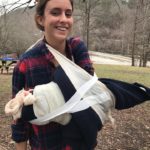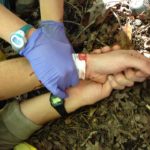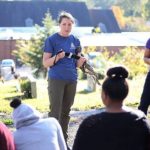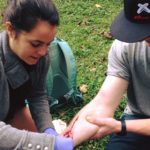Entry-Level Wilderness First Aid Training for Outdoor Enthusiasts
This 16-hour, 2-day entry-level course is the ideal certification for outdoor enthusiasts looking for basic first aid training and backcountry medical skills. Offered at two locations outside of Atlanta, GA, in Roswell and Marietta, Wilderness First Aid (WFA) covers topics ranging from preparation and prevention to assessment and treatment. Students will have an opportunity to learn practical skills through hands-on scenarios as well as in a traditional classroom setting.
Wilderness First Aid (WFA) is a 2-year certification. For an additional fee, taking a WFA course can also rectify a soon-to-expire Advanced Wilderness First Aid (AWFA) or Wilderness First Responder (WFR) certification.
This course does not include CPR. American Safety and Health Institute (ASHI) CPR and AED courses are scheduled on the first night of the WFA. CPR available as an add-on when you check out.
Please call for information regarding COVID-19 certification extensions.
Recommended For:
Outdoor enthusiasts looking for basic first aid training.
Certifications Received:
• 2-year WFA Certification
Course Dates
| Course | Dates | Location | Tuition | |
|---|---|---|---|---|
| No Scheduled Courses |
Course Outline
Course Topics:
- Wilderness vs. Urban First Aid
- Patient Assessment System
- Initial Survey
- Primary Survey
- Secondary Survey
- Documentation (SOAP Notes)
- Patient Lifting and Moving
- Shock
- Traumatic Issues
- Musculoskeletal – Sprains, Strains, & Fractures
- Spinal Cord Injury Management
- Soft Tissue Injuries
- Stopping the Bleed
- Wound Cleaning
- Bandaging Skills
- Infections
- Burns
- Environmental Issues
- The Human Animal
- Hypothermia and Frostbite
- Heat Illness: Dehydration, Heat Exhaustion, & Heat Stroke
- North American Bites & Stings
- Lightning
- Back Country Essentials: Bivouac & Survival Skills
- Medical Issues
- Changes in Level of Consciousness
- Breathing Issues: Asthma, Allergic Reaction, etc.
- Anaphylaxis
- Diabetes
- Chest Pain
- Written Test and Course Completion
Course Notes:
Please note that these are a list topics and subjects typically covered in the Wilderness First Aid (WFA) course. Topics and subjects may not be taught in this order or progression.
SOLO Courses are very hands-on and include many outdoor scenarios and skills labs so participants will have time to hone their skills. We spend time outside - rain, snow, or sunshine so be prepared for the weather.
CPR and AED is not included in the WFA, but CPR is offered the first night after class. Anyone wishing to sign up for CPR & AED will need to register for that class separately.
Packing List
You should plan to have clothing appropriate to the season in which you will be taking the class, as you will spend a significant amount of time outside. The following list is to SUPPLEMENT the clothing you will be wearing. If you have trouble locating some of these items please call us as we have a limited amount for loan.
Necessary items (for all classes)
- Backpack to put everything in (medium to large)
- Rain gear (tops and bottoms)
- Layers of clothing (for splinting exercises and to keep yourself warm during scenarios)
- Warm hat or sun hat
- Water bottles (at least 1 qt/litre)
- Some snacks
- Pen and notepad
- Wrist Watch (cell phone is not sufficient)
- Foot wear appropriate to the terrain (closed toes, no flip flops)
- Insect repellent
- Sunscreen
Additional items
(Optional for WFA, Required for AWFA, WFR, WEMT, WEMT Module)
- Old Sleeping bag or blanket
- Footwear you don't mind getting wet
- Knife
- Plastic tarp or groundsheet (min 6’X6’)
- Head light
- Sleeping pad (ensolite or thermarest)
- Personal first aid kit (Band-Aids etc)
- Trekking poles (useful but not required)


